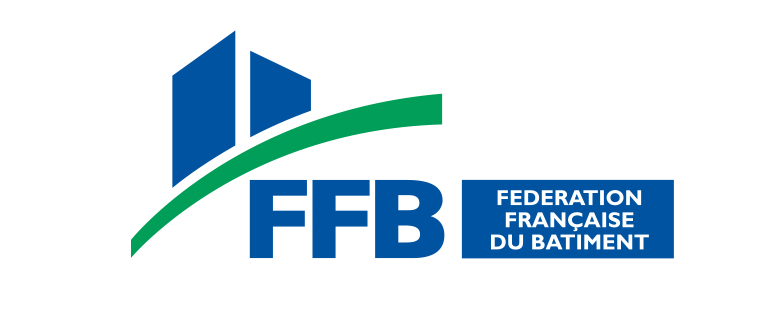Overall construction activity
In 2024, the construction sector experienced a decline of 3,9 % in constant prices in France, mainly due to the negative trend in the building industry (-5,5 %), whereas the public works sector showed a rather good dynamic (+2,3 %).
For 2025, construction activity is expected to decline at a slower pace by 2,6 % in volume terms, with the same rate for both the building industry and public works contracting.
Employment decreased in 2024 and the downturn is expected to accelerate in 2025, with a loss of 50 000 jobs in the building industry, while employment will stabilize in public works.
Housebuilding
After a significant decline of 12,3 % in 2024, the decrease in new housing permits will slow by 3,3 % in 2025. Actually, the recent growth of homebuilders and developers’ sales of private new dwellings, with an easier access to credit along with the 2025 Finance Act - which reintroduces the zero-rate loan (PTZ) for individual housing and so-called relaxed areas - helps creating a more favorable environment for the housing market. As a result, around 320 000 housing units will be authorized in 2025. Moreover, the implementation of the Action Logement and CDC Habitat recovery plan (investment plan to produce 17 000 collective dwellings) will lead to a 4,1 % increase of housing starts in 2025, reaching 303 000 units, which represents an annual rise of just over 10 000 units.
Given the usual construction timelines, housebuilding activity is expected to decline at a slower pace, by 5,4 % in 2025, after a significant 19,1 % drop in 2024 at constant prices.
In 2025, the housing rehabilitation and maintenance market is expected to grow slightly, by 0,6 % in volume terms, after a modest 0,2 % increase in 2024. However, the energy renovation market will grow by only 0,3 %. Indeed, the rules of MaPrimeRénov's incentive have been maintained, but the late vote of the Finance Act will penalize the energy renovation activity, at least during the first quarter of 2025.
Non-residential construction
In 2025, authorized floor spaces will stabilize (-0,2 % at constant prices), once again (+0,0 % in 2024). Offices will continue to collapse (-13,0 %) and industrial buildings to reduce (-3 %). Retail spaces will remain stable (-0,2 %), while other segments - such as hotels, administrative and agricultural buildings - will gradually recover.
The stabilization of authorized floor spaces observed in 2024 and expected in 2025 suggests a limited decline in started surfaces, by -2,1 %, after two years of sharp decreases (-24,0 % compared to 2022).
Thus, non-residential building production is expected to fall down by 8,4 % in 2025, following a 4,1 % decline in 2024 at constant prices.
The strong growth in non-residential rehabilitation and maintenance activity observed since 2021 will lose momentum in 2025, falling to +0,6 % in constant prices (after +2,1 % in 2024). This segment continues to benefit from the mandatory energy audit of tertiary sector and the EduRénov program (renovation of public education buildings), but the expected 2,4 % decline in corporate investment will offset these positive effects.
GDP 2024
BILLION
POPULATION 2024
Total investment in construction in 2024
BILLION
Civil engineering
Public Works activity increases in 2024, but at a slower pace than the previous year (+2,3 % in volume after +4,2 % in 2023). The sector's growth is driven by the launch of structural projects, particularly in some metropolitan areas, and by the easing of inflationary pressures.
However, after two years of growth, concerns are growing for 2025. The sector is anticipating a decline in activity, against the positive effect of the electoral cycle.
The outlook for business will be hampered by the consequences of the budget cuts contained in the Finance Act 2025, which will reduce funding for local authorities and for the ecological transition, while at the same time increasing the tax burden on public works companies.
With the exception of the major operators, who will continue to play a key role in driving growth, public investments are set to decline, while private-sector investment, affected by the real estate crisis and the economic slowdown, will still not pick up.
Regarding overseas activity, exports amounted to €62,2 billion in 2023 and stood for 56 % of the overall civil engineering turnover.
Prices of construction materials
As a whole, the prices of materials for construction declined by 2 % in 2024. In details, PVC, steel, glass or semi-finished aluminum products decreased, while wood, tiles or ready-mix concrete remained almost stable on average throughout the year compared to 2023.
Business registration and bankruptcy
Bankruptcy declarations in construction increased by about 24,9 % in 2024, reaching a fairly high level of 14 900 units, similar to the 2015-2016 average. It mainly concerned very small companies: no more than 5 employees in 87% of cases. Business registrations, meanwhile, remained stable in 2024.
Construction activity

Number of building permits in residential construction




































